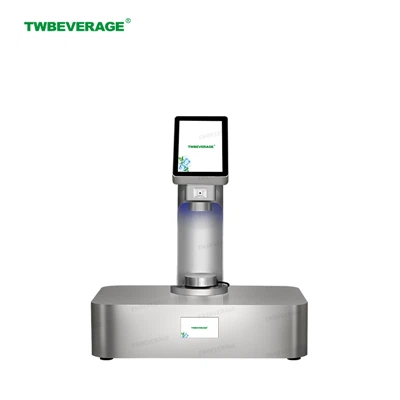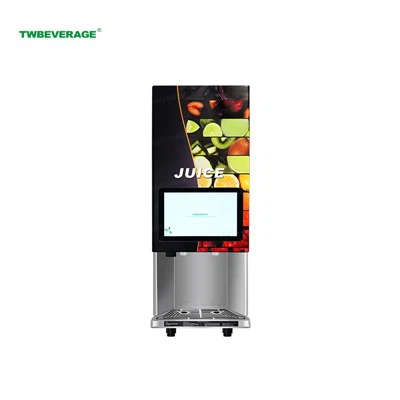Hey there! As a supplier of commercial juice dispensers, I often get asked the question: “Are commercial juice dispensers safe to use?” Well, let's dive right into this topic and break it down.
First off, let's talk about the materials these machines are made of. Most commercial juice dispensers are constructed with food - grade materials. These materials are specifically designed to come into contact with food and beverages without leaching harmful chemicals. For example, the tanks where the juice is stored are usually made of stainless steel or high - quality plastics that are approved by relevant food safety authorities. Stainless steel is great because it's durable, resistant to corrosion, and easy to clean. It doesn't react with the acidic nature of many juices, ensuring that the juice remains pure and free from any unwanted contaminants.
The hoses and tubes in the Cold Drink Juice Machine are also made of food - safe rubber or plastic. These materials are flexible enough to allow the smooth flow of juice but are also resistant to wear and tear. They are regularly tested to make sure they meet strict food safety standards. So, from a material perspective, these dispensers are built with safety in mind.
Now, let's consider the hygiene aspect. Maintaining proper hygiene is crucial when it comes to any food - related equipment, and commercial juice dispensers are no exception. Most modern dispensers, like the Automatic Juice Dispenser Machine, are designed with easy - to - clean features. They have removable parts such as drip trays, nozzles, and tanks. These parts can be easily taken out and washed thoroughly with warm, soapy water. Some even come with self - cleaning functions, which can save a lot of time and effort for the operators.
Regular cleaning not only prevents the growth of bacteria and mold but also ensures that the taste of the juice remains fresh. Imagine if a dispenser isn't cleaned properly; over time, residue from the juice can build up, leading to a funky smell and an off - taste. This not only affects the customer experience but can also pose a health risk. That's why it's recommended to clean the dispenser at least once a day, or more frequently if it's used in a high - volume environment.
Another important safety factor is the electrical safety of these machines. Commercial juice dispensers are equipped with proper grounding and insulation to prevent electrical shocks. They are also designed to meet strict electrical safety standards set by regulatory bodies. Before hitting the market, these machines undergo rigorous testing to ensure that they are safe to use in a commercial setting. However, it's still important for the operators to follow basic electrical safety guidelines, such as not using damaged cords and making sure the machine is plugged into a properly grounded outlet.
Let's also touch on the issue of contamination. Since these dispensers are used to serve multiple customers, there's always a risk of cross - contamination. To address this, many dispensers are designed with features that minimize this risk. For example, some have a closed - loop system where the juice doesn't come into contact with the outside air once it's in the dispenser. This reduces the chances of bacteria and other contaminants getting into the juice. Additionally, the nozzles are often designed in a way that prevents back - flow, so the juice that has been dispensed doesn't flow back into the tank.
But safety doesn't stop at the design and construction of the machine. Proper training for the operators is also essential. Operators should be trained on how to use the dispenser correctly, including how to load the juice, clean the machine, and handle any technical issues that may arise. They should also be aware of the importance of following food safety regulations, such as using gloves when handling the juice and making sure the juice is stored at the correct temperature.
When it comes to the temperature control of the juice, most commercial juice dispensers are equipped with refrigeration systems. These systems keep the juice at a safe temperature, usually between 32°F and 40°F (0°C and 4°C). Keeping the juice at this temperature helps slow down the growth of bacteria and extends the shelf life of the juice. However, it's important to regularly check the temperature of the dispenser to make sure it's working properly.
Now, I know some people might be worried about the additives and preservatives in the juice that's used in these dispensers. While it's true that some commercially - made juices may contain additives, many suppliers are now offering natural and additive - free juices. As a supplier, we work closely with juice producers to ensure that the juices we recommend are of high quality and meet all the necessary food safety standards.
In conclusion, commercial juice dispensers can be very safe to use if they are properly designed, maintained, and operated. The materials used in their construction are food - grade, they are designed with hygiene and safety features, and they meet strict electrical and food safety standards. However, it's up to the operators to follow proper cleaning and operating procedures to ensure the continued safety of the juice being dispensed.
If you're in the market for a commercial juice dispenser and have any concerns about safety or other aspects, don't hesitate to reach out. We're here to provide you with all the information you need and help you make the right choice for your business. Whether you're running a small café or a large restaurant, we have the perfect Cold Drink Juice Machine or Automatic Juice Dispenser Machine for you. Contact us today to start the procurement discussion and find the best solution for your needs.
References


- Food and Drug Administration (FDA) guidelines on food - contact materials
- National Sanitation Foundation (NSF) standards for commercial food equipment
- Industry reports on commercial juice dispenser safety and design






